The fireworks are scheduled to start at 1:00 p.m. ET. Once the Senate is called to order this afternoon, senators will continue with the organizing resolution for the trial itself and they will debate how to conduct the trial. The resolution in question will lay out the specifics of the schedule including when the trial will start each day, how long each session can be and how long each phase will last.
In the left side of the ring, we have the House Managers, who were appointed last week and who have filed the Articles of Impeachment, including the charges they are alleging against the President, with the Senate. To present the articles to the Senate formally, Lead Manager Adam Schiff read them aloud, in their entirety. The written statement submitted by the House of Representatives was beautifully written and supported by evidence and facts that back up each allegation.

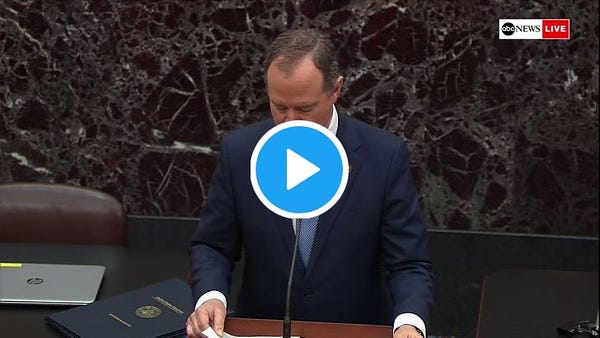
Both Sides Present Their Case
On Saturday, the seven House Managers filed a 111-page brief outlining the case for why Donald Trump should be removed from office for abuse of power and obstruction of Congress. The filing asserted that Trump's actions represented the "worst nightmare" of the framers of the U.S Constitution. The Managers went on to say that "President Trump abused the powers of his office to invite foreign interference in an election for his own personal political gain and to the detriment of American national security interests." Democrats allege that Trump "abandoned his oath to faithfully execute the laws and betrayed his public trust.” Ultimately, House Democrats allege that “President Trump’s misconduct presents a danger to our democratic processes, our national security, and our commitment to the rule of law. He must be removed from office."

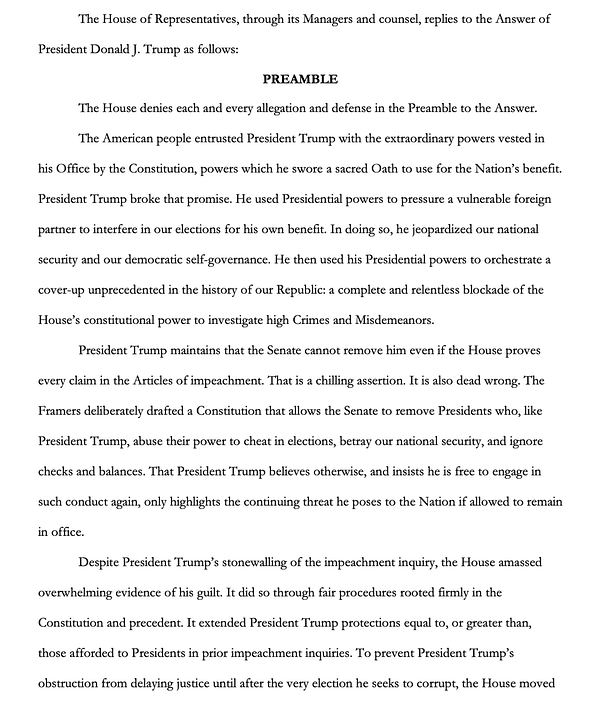
In response to the House’s lengthy accusations, Trump’s legal team filed a six-page response to the charges brought against him by the House. In what reads more like a rally cry and paranoid assessment of an unjustified attack on an all-powerful king, Trump’s team dismissed the two articles of impeachment as “a dangerous attack on the right of the American people to freely choose their president.” The memo continues to decry the impeachment process “is a brazen and unlawful attempt to overturn the results of the 2016 election and interfere with the 2020 election," in an attempt to further dismiss Democratic allegations.

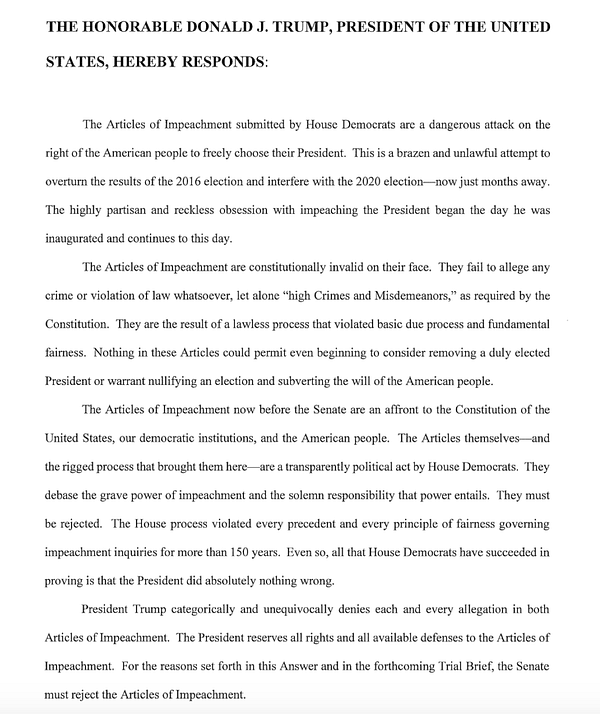
Trump’s memo, which is signed by Trump's personal attorney Jay Sekulow and White House Counsel Pat Cipollone, also makes a point to state that "President Trump categorically and unequivocally denies each and every allegation in both Articles of Impeachment." If you have not read both memos, I highly recommend you use both of the links I have provided to do so. The comparison of the work alone should help you to discern the disproportionate way in which each side has undertaken their duty and Constitutional responsibilities.
Rules of the Constitution
The only rules about impeachment in the Constitution are that there are no rules. Just kidding, there are a few rules, but they are very limited and fairly broad, which is how Mitch McConnell has been able to delay in formalizing the procedure for today. While the Constitution grants the Senate the sole power to hold an impeachment trial, there are only three formal requirements after that. Senators must swear an oath, a two-thirds majority is required to remove an official and the Supreme Court Chief Justice presides over the trial of a president.
It’s worth noting that there is no real-time punishment for any senator who breaks his oath and does not do his sworn duty. The oath each senator took reads, “Do you solemnly swear that in all things appertaining to the trial of the impeachment of Donald John Trump, president of the United States, now pending, you will do impartial justice according to the Constitution and laws, so help you god?” But any direct acts of partiality have no immediate recourse. Senators are also required to swear an oath to “support and defend the Constitution” when they take office and that hasn’t been working out too well for the majority. The only real repercussion from breaking the impeachment trial oath is for the public to vote them out of office.

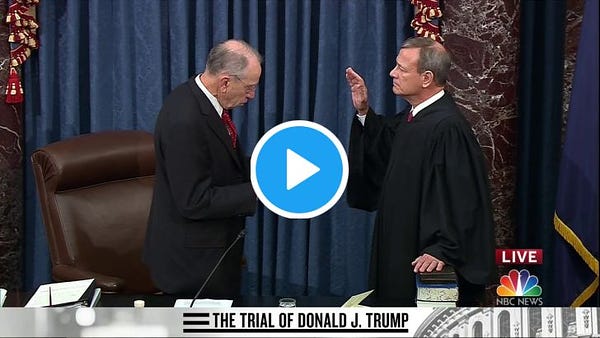
Every other detail is left to the Senate to determine with the all of the regular parliamentary protocols still in place. Last Thursday, Chief Justice Roberts was sworn in by the Senate and then proceeded to swear in the Senators present. Technically, the only other Constitutional requirement left is that a two thirds majority is reached for removal. With regard to Roberts and his sworn oath, I have a little more faith than I do with certain members of the Senate. Roberts has an elevated understanding of this act, and has been bound at many points in his life by his reputation and his word. In theory, he is supposed to be less of a political animal and not as easy to sway as someone from the Legislative Branch. But we will have to see it to believe it.
The Rules So Far
Mitch McConnell has provided a four page explanation of the rules that have been established so far and they are really strange. It outlines a two-day schedule that would give House prosecutors just 24 hours over two days to make their opening arguments. The plan also allows for 12 hour sessions that could go well into the night and early morning hours, considering the start time will be at 1:00 in the afternoon.
This shortened schedule is clearly intended to rush through Trump's impeachment trial at rapid pace with the bulk of action appearing late into the night when most Americans will be tuned out to sleep. With only 16 hours to submit questions to the prosecution and defense and only four hours dedicated to debate, there will not be nearly enough time to sift through all of the evidence. McConnell has also made a backward point of calling witnesses at the end of the trial, instead of the beginning and only after a vote by the Senate to call them. There is also a caveat that witnesses who are to be subpoenaed must first be deposed, and this was likely a safeguard for Republicans in the event that they lost the vote to call witnesses.

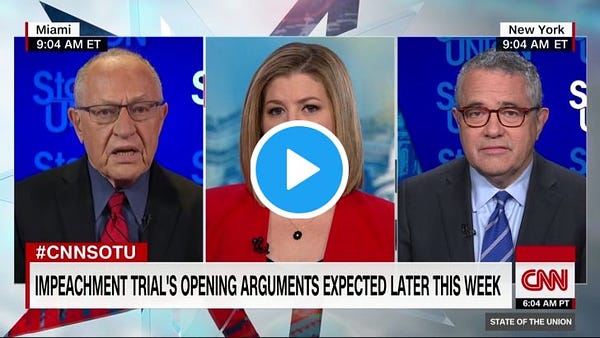
Trump's legal team will also be given the same amount of time to respond with no limits on the type of presentations or representatives he can use. Alan Dershowitz, a member on Trump’s legal team, has already said he intends to represent Trump as an “advocate” to make the legal argument that nothing Trump has done thus far has risen to the level of an impeachable offense. It’s worth noting that most Constitutional Law Scholars disagree with this tack.
It All Comes Down To Witnesses
The most critical aspect of the trial will come down to whether or not Democrats can win a majority vote to call witnesses in the impeachment trial. It’s insane that we are even discussing a trial without witnesses, but thanks to Mitch McConnell and all of Trump’s other puppets, here we are. Democrats want to call at least four witnesses, including former national security adviser John Bolton, and after the recent interviews from Lev Parnas, they will likely want to call more. Republicans argue that calling witnesses would be unnecessary, but if witnesses are to be allowed, they would insist on calling the whistleblower and Hunter Biden because deflect, deflect, deflect.
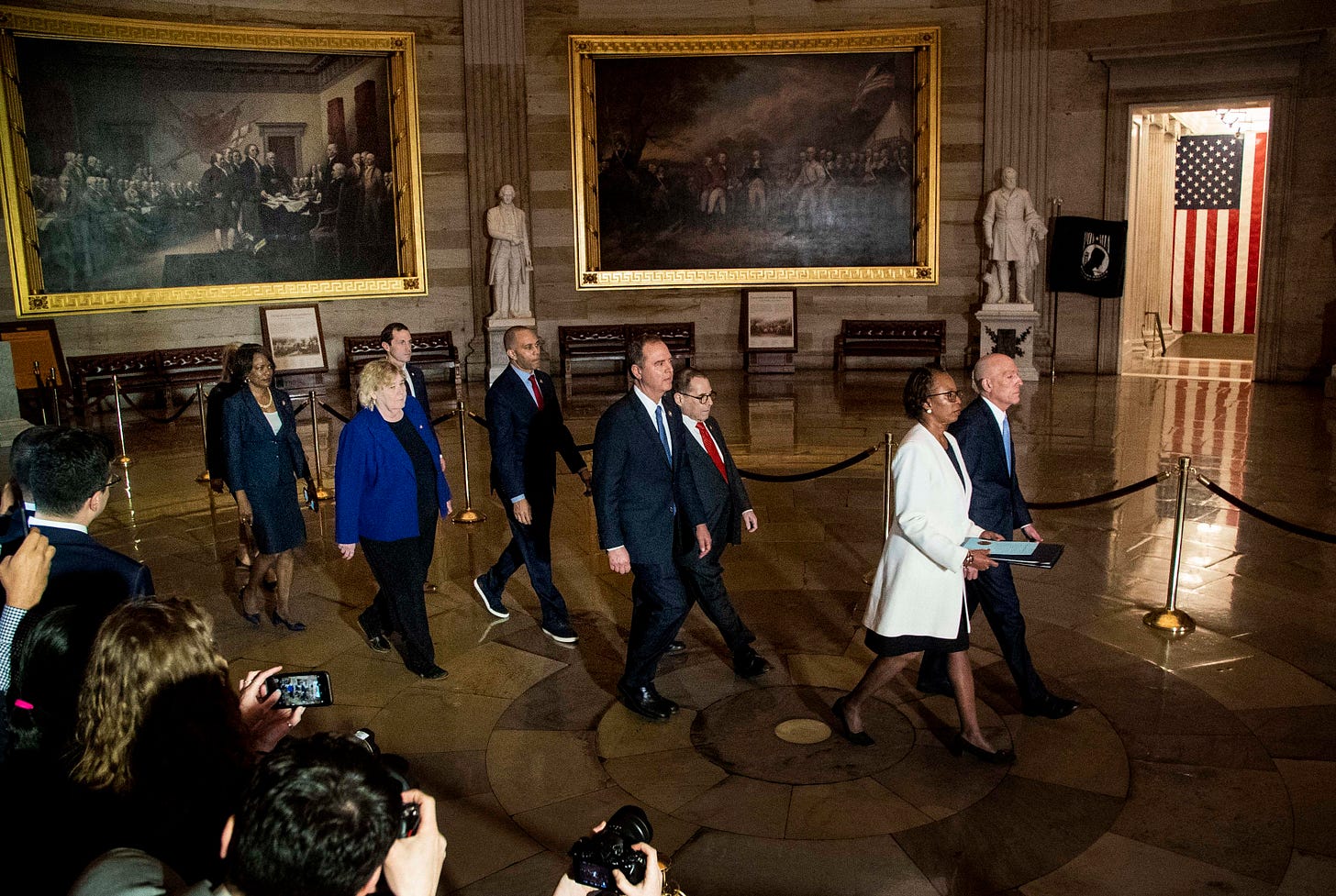
(House Impeachment Managers walk the Articles of Impeachment to the Senate for presentment last Thursday on Capitol Hill, via Getty Images.)
Expect both sides to come out swinging once the session begins today, with both sides using procedural tactics to get their win on the witness front. You can expect for both sides to call for votes immediately. Senate Majority Leader Mitch McConnell (R-KY) says he has the votes to delay a decision on witnesses until after opening arguments from both sides and after senators submit written questions to both sides. Schumer is looking for four Republican votes here to force a vote on hearing from witnesses sooner in the process and to make sure they are heard at all.
Senate Minority Leader Chuck Schumer (D-NY) has urged subpoenas for four witnesses and three batches of documents so far and there could be more. Schumer says, “As soon as Sen. McConnell offers this resolution, I will be offering amendments to address the many flaws in this deeply unfair proposal and to subpoena the witnesses and documents we have requested.”
To follow along with the session this afternoon in real time or to catch up later, follow me at Twitter here, where I will be live tweeting the events of the day to keep you posted on major events. I will also leave you with a video from 1999, where Senator Lindsey Graham (R-SC) is arguing against the very defense that Trump intends to make in the Senate over the next few days.

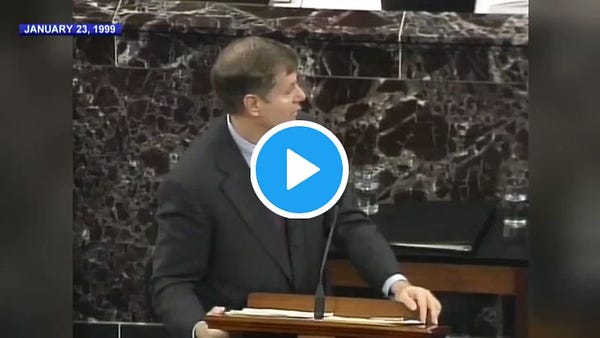
Here’s another of Mitch McConnell, who recently went on Fox News to argue that he just wants the same rules for Trump that we had for Clinton, where he says that there should be witnesses called in an impeachment trial.


If you like this piece and you want to support independent journalism from a female perspective, you can forward this article to others or send a gift a subscription to someone else today. Your paid subscriptions allow me to keep publishing critical and informative work that is often made available to the public.
Amee Vanderpool writes the “Shero” Newsletter and is an attorney, contributor to Playboy Magazine and analyst for BBC radio. She can be reached at avanderpool@gmail.com or follow her on Twitter @girlsreallyrule.




Thank you, Amee.
You’re the bomb, Amee! Thank you!